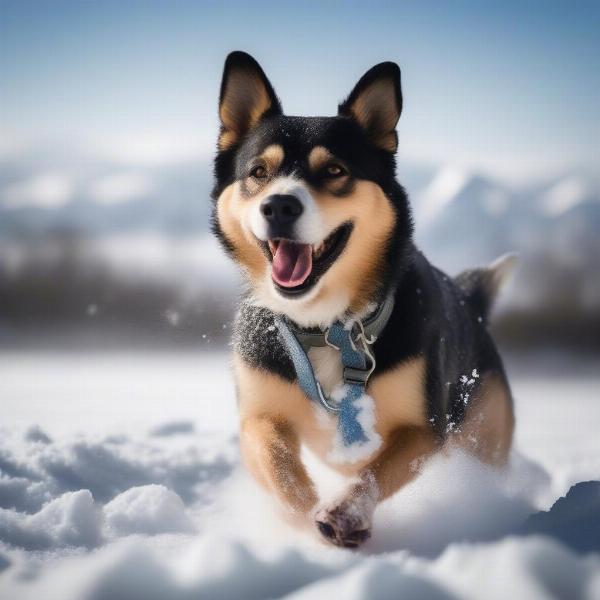Snow dogs, with their thick coats and love for cold weather, captivate many. If you’re considering welcoming one of these majestic creatures into your life, “snow dog for sale” is likely a search term you’ve used. This article dives into the world of snow dogs, exploring popular breeds, what to consider before buying, and how to ensure a happy and healthy life for your new furry friend.
Popular Snow Dog Breeds Available for Sale
Several breeds thrive in snowy climates. Each has unique characteristics, so researching carefully is essential. Some popular choices include:
- Siberian Husky: Known for their striking blue eyes and wolf-like appearance, Huskies are energetic and independent. They require a lot of exercise and mental stimulation.
- Alaskan Malamute: Larger than Huskies, Malamutes are powerful and were originally bred for hauling heavy loads. They are affectionate but can be stubborn, requiring experienced owners.
- Samoyed: With their bright white coats and perpetually smiling faces, Samoyeds are friendly and playful. They are known for their love of people and make great family dogs.
- American Eskimo Dog: These intelligent and alert dogs come in various sizes and are known for their beautiful white coats. They are eager to please and excel in dog sports.
- Canadian Eskimo Dog: One of the oldest and rarest breeds, these powerful dogs were originally bred for sledding and hunting. They require experienced owners familiar with their unique needs.
What to Consider Before Buying a Snow Dog
Owning a snow dog is a significant commitment. Before searching for “snow dog for sale,” consider the following:
- Climate: While these breeds love the cold, they can adapt to warmer climates with proper care. Ensure you can provide adequate cooling during hotter months.
- Exercise Needs: Snow dogs are energetic and require ample exercise. Are you prepared to provide daily walks, runs, or other activities?
- Grooming: Their thick coats require regular brushing, especially during shedding season. Are you prepared for the grooming commitment?
- Training: Some snow dogs can be independent and require consistent training from an early age.
- Lifestyle Compatibility: Consider your living situation and lifestyle. A snow dog may not be suitable for apartment living or individuals with a sedentary lifestyle.
Finding a Reputable Breeder
When you’re ready to find a “snow dog for sale,” choosing a responsible breeder is crucial. A good breeder will:
- Prioritize the health and well-being of their dogs.
- Screen potential buyers to ensure their dogs go to good homes.
- Provide health clearances for their breeding dogs.
- Answer your questions openly and honestly.
- Allow you to meet the parents of the puppies.
Ensuring a Happy and Healthy Life for Your Snow Dog
Once you’ve brought your new companion home, providing proper care is essential:
- Nutrition: Feed a high-quality diet formulated for active breeds.
- Veterinary Care: Regular checkups and vaccinations are essential.
- Socialization: Expose your dog to various people, places, and situations from a young age.
- Mental Stimulation: Provide toys and activities to keep your dog mentally engaged.
- Enrichment: Create opportunities for your dog to engage in natural behaviors like digging and exploring.
Conclusion
Finding the perfect “snow dog for sale” requires careful consideration and research. By understanding the specific needs of these magnificent breeds and choosing a responsible breeder, you can ensure a long, happy, and healthy life for your new winter companion. Remember that bringing a dog into your life is a significant commitment, but with proper care and attention, the rewards are immeasurable.
 Happy and Healthy Snow Dog
Happy and Healthy Snow Dog
FAQ
- Are snow dogs good with children? Many snow dogs are good with children, but early socialization is essential.
- How much exercise does a snow dog need? Snow dogs need a significant amount of exercise, at least an hour per day.
- Can snow dogs live in warm climates? Yes, but they need access to shade and cooling measures during hot weather.
- What is the average lifespan of a snow dog? The lifespan varies depending on the breed, but it’s typically between 12-15 years.
- Are snow dogs difficult to train? Some snow dogs can be independent and require consistent training.
- How much grooming does a snow dog need? Snow dogs require regular brushing, especially during shedding season.
- Where can I find a reputable snow dog breeder? Research breeders carefully, ask for references, and visit the breeder in person.
ILM Dog is your trusted resource for expert advice on dog breeds, care, and training. We offer valuable insights and resources to help you navigate every aspect of dog ownership. For more information on dog breeds and care, visit our website. Contact us at [email protected] or +44 20-3965-8624 for personalized guidance. ILM Dog is here to support you on your journey with your canine companion.